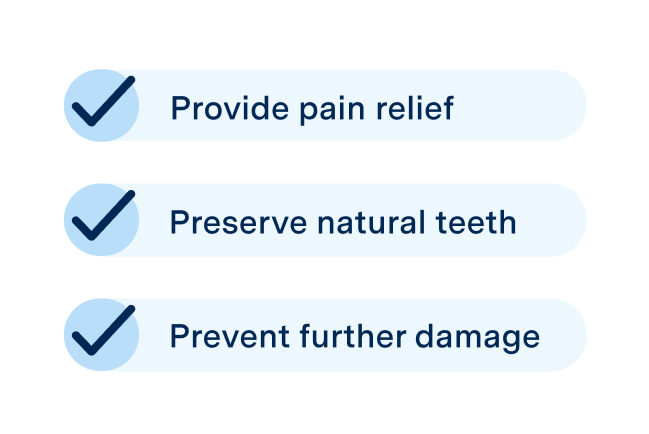Get endodontic therapy for fast relief—today
Same-day treatments available
When you’re referred for endodontic therapy, trust the dentists and root canal specialists at Aspen Dental to help relieve pain and restore the health, strength and appearance of your natural tooth.

What is a endodontic treatment?
Endodontics is a dental specialty that includes endodontic treatment—a procedure that removes infected or inflamed pulp to help save a tooth. An Aspen Dental endodontist, trained in treating complex causes of tooth pain, uses advanced skills to perform this treatment.

Tooth infection?
There’s an endondotist for that
And they can treat even more. As specialists, endodontists can get you out of pain, help avoid tooth extractions and preserve your oral health long-term.
Why you’ll prefer Aspen Dental for endodontics
We’ve made it easier for you to get the specialized endondontic treatment you need.
Same-day procedure
We can help you get out of pain quickly with same-day emergency treatments.
Proven expertise
Aspen Dental endodontists have extensive training to diagnose and treat complex cases.
Care under one roof
Get specialty care in the same place as your general dentistry— all in one place with one care team.
Ease of mind
Take comfort with a smooth procedure and quicker recovery from our advanced technology.

Your first endodontic treatment could be the last one you ever need
¹Source: Salehrabi, R., & Rotstein, I. (2004). Endodontic treatment outcomes in a large patient population in the USA: an epidemiological study. Journal of endodontics, 30(12), 846–850.
Top 3 benefits of endodontic treatment
One of the common misconceptions about root canal procedures is that they are very painful. In fact, they’re one of the only dental procedures that can remove pain and preserve your teeth in the same day.
Preserve your tooth
Save a tooth’s natural appearance, strength and function while supporting overall oral health.
Relieve a toothache—fast
Today’s root canals provide a quicker recovery time with less pain thanks to modern technology and techniques.
Enjoy life, naturally
Speak and chew more like you—plus, avoid tooth extractions that could cause teeth to shift.
Which type of endodontic therapy is right for me?
Root canal treatment
The most common procedure performed by an endodontist to remove infected or damaged pulp. The root canal system also gets cleaned, shaped and then filled and sealed to help prevent infection.
Learn more about root canal treatments >
Endodontic retreatment
After a root canal, if you experience dental pain or discomfort, endodontic retreatment may be needed to reopen the tooth to address any new issues to help save the tooth.
Apicoectomy
This surgical procedure removes inflamed or infected tissue and is only performed when conventional root canal therapy isn't enough to save a tooth.
All the specialty care you need—under one roof
Endodontic therapy FAQs
What is the difference between a root canal and an endodontic therapy?
The terms "root canal" and "endodontic therapy" are often used interchangeably, but they both refer to the same procedure. A root canal, which is a type of endodontic treatment, involves removing the infected or damaged pulp inside your tooth. The pulp is the soft tissue that contains nerves and blood vessels, and when it becomes inflamed or infected, it can cause significant pain. During a root canal, an endodontist cleans out the infected pulp, disinfects the inside of the tooth and then fills and seals it to prevent further infection.
So, when you hear "root canal" or "endodontic treatment," they’re talking about the same process designed to save your natural tooth and relieve pain. The goal is to help you keep your tooth rather than having it extracted.
What is an endodontist, and what does an endodontist do?
An endodontist is a dental specialist who focuses on treating issues related to the inside of your tooth, particularly the pulp, which contains nerves, blood vessels and connective tissue. They are experts in performing procedures like root canals, which are designed to save teeth that have become infected or damaged.
Endodontists receive additional training beyond dental school, specializing in diagnosing and treating complex causes of tooth pain and performing delicate procedures aimed at preserving your natural teeth. If you’re experiencing severe tooth pain, sensitivity to hot or cold, or have a tooth injury, an endodontist has the advanced skills and tools needed to treat these issues effectively.
Endodontists are often considered the go-to professionals for root canal therapy and their work helps prevent the need for tooth extractions, allowing you to maintain a healthy smile.
What is the most common type of endodontic procedure?
The most common type of endodontic procedure is a root canal.
A root canal is a procedure that treats the inside of the tooth when the pulp, which contains nerves and blood vessels, becomes infected or damaged. During a root canal, the infected or inflamed pulp is carefully removed, and the inside of the tooth is cleaned, disinfected, and then filled and sealed. This treatment helps save the natural tooth and prevents the need for extraction, allowing you to maintain your smile and dental health. Root canals are highly effective in relieving pain and restoring the function of the affected tooth.
What is the most common reason for endodontic treatment?
The most common reason for endodontic treatment, such as a root canal, is an infection or inflammation of the tooth's pulp.
This can occur due to deep decay, repeated dental procedures on the same tooth, a crack or chip in the tooth, or an injury. When the pulp becomes infected or inflamed, it can cause significant pain, sensitivity, and even lead to an abscess if left untreated. Endodontic treatment removes the infected or damaged pulp, cleans and disinfects the inside of the tooth and then seals it to prevent further dental issues, ultimately saving the tooth and relieving pain.
What does an endodontist do with an infected root canal?
When an endodontist treats an infected root canal, they carefully remove the infected or damaged pulp from inside the tooth. They then clean and disinfect the root canals to eliminate any bacteria. After the area is thoroughly cleaned, the endodontist fills and seals the canals to prevent future infection. This process helps save the tooth, relieve pain and restore the tooth's function.
How long does it take to recover from endodontic treatment?
Recovery from endodontic treatment, such as a root canal, typically takes a few days. Most patients experience mild discomfort or soreness in the treated area, which usually subsides within a few days to a week. Over-the-counter pain relievers are often enough to manage any discomfort. It's important to follow your dentist's aftercare instructions, which may include avoiding hard or chewy foods on the treated tooth for a short time. In most cases, you can return to your normal activities the day after the procedure. If you experience severe pain or swelling, it's important to contact your dentist.
